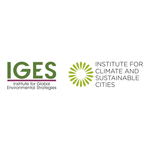TOKYO–(BUSINESS WIRE)–#GST–The Institute for Global Environmental Strategies (IGES), together with Manila-based think tank, the Institute for Climate and Sustainable Cities (ICSC), and civil society organisations across Southeast Asia, backed by the Climate Change Commission of the Philippines, called for urgent and significant delivery of Paris climate commitments to help communities, especially the most vulnerable, survive and thrive amid the climate crisis.
“As a climate vulnerable region, adaptation remains our response anchor, with mitigation as a co-benefit. We must act on climate change for our long-term resilience and development. We need powerful regional voices in the Global Stocktake (GST), and we hope to achieve that through this collaboration,†said Angelo Kairos dela Cruz, Executive Director of the Institute for Climate and Sustainable Cities (ICSC), during the launch of the Southeast Asia (SEA) Hub of the Independent Global Stocktake (iGST) on 16 May.
The GST was established by the United Nations Framework Convention on Climate Change (UNFCCC) to assess the world’s collective progress towards the goals of the Paris Agreement, which was adopted in 2015 with 196 countries committing “to limit the global temperature increase to 1.5°C above pre-industrial levels.â€
Led by IGES and ICSC, with support from the ClimateWorks Foundation, the iGST SEA Hub aims to champion a purposive GST through empowering non-state actors (NSAs), including scientists, campaigners and other civil society representatives, to connect their actions with the GST process.
Representatives from Japan, the Philippines, Thailand, Viet Nam, Indonesia, Cambodia, Malaysia, Timor Leste and Lao PDR, who are now established members of the Hub, gathered from 16-18 May, 2023 to lay down their action plans for Southeast Asia. The region has been at the forefront of impacts for decades, and its critical sectors, including rice production, food security, energy, forestry and marine ecosystems, continue to be threatened by climate change.
“The Climate Change Commission supports the iGST SEA Hub to ensure that most, if not all, perspectives are captured in the stocktaking process. The Philippines hopes that Southeast Asian countries can further strengthen their convergence and synergies on climate actions towards attainment of our shared vision of a sustainable and climate-resilient future,†said Secretary Robert Borje, Vice Chairperson and Executive Director of the Commission, in his keynote address.
Each Global Stocktake is a two-year process, and is conducted every five years. This year marks a critical juncture for global climate negotiations, as the first GST will conclude in the upcoming UN climate conference (COP28) in Dubai, United Arab Emirates in November. UNFCCC Associate Programme Officer Tamaki Takao also emphasised the importance of the third technical dialogue in June this year, which will serve as the venue to contribute final inputs before the culmination of the first GST.
Countries are expected to update their climate pledges and increase international cooperation based on GST outcomes, to ultimately deliver stronger, more ambitious climate action across the globe.
NOTES TO THE EDITOR
The Independent Global Stocktake (iGST) is a consortium of civil society actors working together to support the Global Stocktake (GST) process. iGST aims to enhance the transparency and accountability in the GST by incorporating independent scientific and technical knowledge from non-state actors, generating momentum for ambitious climate action. Apart from Southeast Asia, iGST also has regional hubs in West Africa, and Latin America and the Caribbean.
The iGST SEA Hub was officially launched on 16 May 2023, followed by a series of workshops from 16-18 May, with the aim of establishing a framework for the Hub. For more information, visit icsc.ngo/igst-sea-hub.
ABOUT
The Institute for Global Environmental Strategies (IGES) is a Japan-based think tank that specialises in environmental policy and sustainable development. IGES works towards promoting sustainable societies by conducting policy-oriented research, providing recommendations, and facilitating dialogue among various stakeholders.
The Institute for Climate and Sustainable Cities (ICSC) is a Manila-based climate and energy policy group advancing climate resilience and low-carbon development.
Contacts
Yuri Katsuike, IGES: [email protected] +81 807 410 1620
Anton Onato, ICSC: [email protected], +63 995 991 2230, +63 917 149 5649







